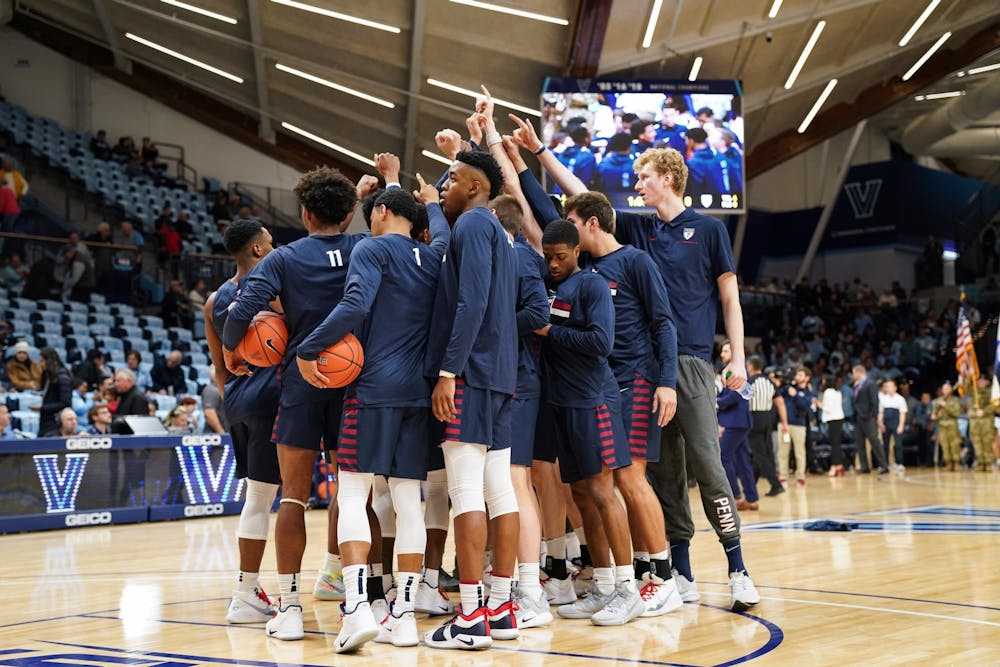
Coach Steve Donahue has led Penn to two major road wins over power-conference opponents but has also lost two games to bad teams.
Credit: Chase SuttonVILLANOVA, Pa. — Penn men’s basketball has played nine games. The Quakers have won five — two against power-conference teams in enemy territory as double-digit underdogs. Of the four losses, two have come against nationally ranked opponents in games that were closer than the final score indicated. But then there are the other two losses — both of which came against worse teams and by large margins.
What is a Penn fan to make of that? Here’s a team that beats tough opponents, hangs with great ones, and loses to bad teams all in the first month of the season. What should we expect moving forward?
First, let’s add some nuance to this picture.
Penn’s impressive wins — at Alabama, at Providence, and arguably even over Central Florida — were examples of a mid-major school outplaying a high-major one. Those were upsets, but not lucky ones. The Quakers were the better team for long stretches in those games.
Those wins, coupled with the close losses to clearly superior nationally ranked programs like No. 12 Arizona and No. 23 Villanova, prove that the Quakers have the talent and grit to hang with strong opponents in big games. Penn is not a team that should be ranked, but it can present a formidable challenge to pretty much anyone in the country.
“I think both [Arizona and Villanova] are No. 1 and 2 seeds in the NCAA Tournament. We played them both in hostile environments. I thought we were toe-to-toe for 38 minutes. What I hope is that we grow the next six weeks before the League really kicks in and just become a really good team,” coach Steve Donahue said. “I think this is the most potential of any team I’ve had at Penn.”

While the narrative that Penn plays up to big teams and down to bad ones is compelling — it’s one we heard last season, when Penn won the Big 5 but started 0-3 in the Ivy League — it doesn’t really hold up against the evidence. The Quakers have played four opponents ranked below them in KenPom: Rice, La Salle, Lafayette, and Long Beach State. They’re 2-2 in those games — not good, but not a sign of impending doom either.
“There’s a couple reasons for that; you've got to peel the onion back a bit,” Donahue said. “Lafayette is playing their asses off. We didn’t have our [then-]leading scorer [freshman guard Jordan Dingle].
“And then the Rice game, we flew down to Alabama, we were delayed coming back. Then we had class and we have to do a wake-up call at 5 a.m. to get down there [to Houston]. We just didn’t play that well. But that’s on their home court — Duke loses to Stephen F. Austin on their court — Rice is way better than [SFA]. We don’t have the margin [for error] at this level — we’re playing all these teams and we can’t skip a step at all,” Donahue said. “I’m disappointed we lost, but I also think it’s all part of the process.”
For a team with so few home games on the schedule, the Quakers will have to learn how to handle the stress and grind of the road sooner rather than later. Ivy teams in particular play a lot of games under tough travel circumstances — every other week between January and March includes a game played on the road after playing a different opponent in a different town the night before.

Even as things stand now, this is a strong team. It has weaknesses: a lack of trustworthy depth, hot-and-cold shooting, and what Donahue called the Achilles heel: free-throw shooting. But its strengths and the play of the core of senior leaders outweigh those weaknesses most nights.
And with players returning from injury and small improvements on the details that have lost them games against great teams — some foul shots here or there, a contested layup that didn’t fall, a bad turnover at the wrong time — the Quakers are positioned to make a run for an Ivy title and have some Cinderella qualities come March.
That’s the lesson of the first month. This team, not yet at its best, can hang around with No. 23 Villanova for 36 or 37 minutes. It’s not at-large material, but it’s pretty good.
That’s what this team is: not at-large material, but pretty damn good, nonetheless.

THEODOROS PAPAZEKOS is a College senior from Pittsburgh and Senior Sports Editor for The Daily Pennsylvanian. He can be reached at papazekos@thedp.com.
The Daily Pennsylvanian is an independent, student-run newspaper. Please consider making a donation to support the coverage that shapes the University. Your generosity ensures a future of strong journalism at Penn.
Donate







